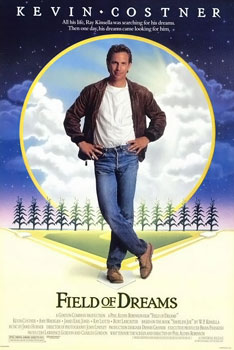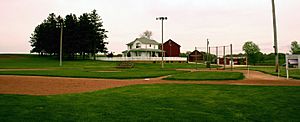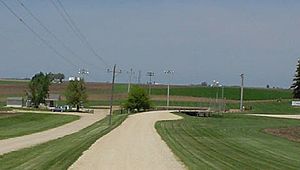Field of Dreams facts for kids
Quick facts for kids Field of Dreams |
|
|---|---|

Promotional poster by Mick McGinty and Olga Kaljakin
|
|
| Directed by | Phil Alden Robinson |
| Produced by | |
| Screenplay by | Phil Alden Robinson |
| Starring | |
| Music by | James Horner |
| Cinematography | John Lindley |
| Editing by | Ian Crafford |
| Studio | Gordon Company |
| Distributed by | Universal Pictures |
| Release date(s) | May 5, 1989 |
| Running time | 107 minutes |
| Country | United States |
| Language | English |
| Budget | $15 million |
| Money made | $84.4 million |
Field of Dreams is a 1989 American sports fantasy drama film written and directed by Phil Alden Robinson, adapting W. P. Kinsella's 1982 novel Shoeless Joe. The film stars Kevin Costner, Amy Madigan, James Earl Jones, Ray Liotta and Burt Lancaster in his final film role. It was nominated for three Academy Awards, including for Best Original Score, Best Adapted Screenplay and Best Picture.
In 2017, the film was selected for preservation in the United States National Film Registry by the Library of Congress as being "culturally, historically, or aesthetically significant".
Contents
Plot
36-year-old Ray Kinsella (Kevin Costner) lives with his wife, Annie (Amy Madigan), and daughter, Karin (Gaby Hoffmann), on their Iowan corn farm. Troubled by his broken relationship with his late father, John Kinsella (Dwier Brown), a devoted baseball fan, he fears growing old without ever achieving anything.
While walking through his cornfield one evening, he hears a voice whispering, "If you build it, he will come". He sees a vision of a baseball diamond in the cornfield and the great "Shoeless" Joe Jackson (Ray Liotta) standing in the middle. Believing in him, Annie lets him plow under part of their corn crop to build a baseball field, at risk of financial hardship.
As Ray builds the field, he tells Karin about the 1919 Black Sox Scandal. Several months pass, and just as Ray is beginning to doubt himself, Shoeless Joe appears, asking if others can play and returns with the seven other Black Sox players. Annie's brother, Mark (Timothy Busfield), can't see the players, warning they are going bankrupt and offers to buy the land. Meanwhile, the voice urges Ray to "ease his pain".
Ray and Annie attend a PTA meeting, where she argues against someone who is trying to ban books by Terrence Mann (James Earl Jones). Ray deduces the voice was referring to Mann, who had named one of his characters "John Kinsella", and once professed a childhood dream of playing for the Brooklyn Dodgers. When Ray and Annie have identical dreams about Ray and Mann attending a game at Fenway Park, Ray finds Mann in Boston. Mann, a recluse, agrees to attend one game; Ray hears the voice urging him to "go the distance", seeing statistics on the scoreboard for a player Moonlight Graham (Burt Lancaster), who played in game for the New York Giants in 1922 but never got to bat. Mann also admits having heard the voice and seen the scoreboard.
They drive to Minnesota, learning that Graham, who was a physician, died years earlier. Ray finds himself in 1972, encountering an elderly Graham, who states he happily left baseball for a satisfying medical career. During the drive back to Iowa, Ray picks up a young hitchhiker (Frank Whaley), Archie Graham, who's looking for a baseball field. Ray later tells Mann that his father dreamed of being a baseball player, but later tried to make him pick up the sport instead. At 14, after reading Mann's books, Ray stopped playing catch with his father, and they became estranged after he mocked John for having "a hero who was a criminal". Ray admits that his greatest regret is that they never reconciled. Arriving at the farm, they see various classic all-star players have arrived, fielding a second team. A game is played, and Archie finally gets his turn at bat.

The next morning, Mark returns, demanding that Ray sell the farm or the bank will foreclose on him. Karin insists that people will pay to watch the ball games. Mann agrees, saying that "people will come" to relive their childhood innocence. A scuffle breaks out between Ray and Mark, knocking Karin off the bleachers. Graham saves her, knowing he will be unable to return after stepping over the boundary. Having become old Dr. Graham again, he reassures Ray he has no regrets. He is commended by the other players, and then disappears into the corn. Suddenly, Mark can see the players and urges Ray to keep the farm.
Shoeless Joe invites Mann to enter the corn, and Mann disappears into it. Ray is angry at not being invited, but Joe rebukes him, glancing towards the catcher at home plate, saying, "If you build it, he will come." When the catcher removes his mask, Ray recognizes him as his father as a young man. Ray realizes "ease his pain" referred to his father.
Ray introduces John to Annie and Karin without revealing their relationship. As John begins to head towards the cornfield, Ray, calling him "Dad", asks if he wants to play catch. They play as hundreds of cars are seen approaching the field, fulfilling the prophecy that people will come to watch baseball.
Cast
- Kevin Costner as Ray Kinsella
- Amy Madigan as Annie Kinsella
- Gaby Hoffmann as Karin Kinsella
- James Earl Jones as Terence Mann
- Ray Liotta as Shoeless Joe Jackson
- Timothy Busfield as Mark
- Burt Lancaster as Dr. Archibald "Moonlight" Graham
- Frank Whaley as young Archibald Graham
- Dwier Brown as John Kinsella
- Lee Garlington as Beulah Gasnick
- Michael Milhoan as Buck Weaver (3B)
- Steve Eastin as Eddie Cicotte (P)
- Charles Hoyes as Swede Risberg (C)
- Art LaFleur as Chick Gandil (1B)
In addition, Anne Seymour, in her final film role (she died four months before the film's release) played the kindly Chisholm publisher who helps Ray and Mann.
The identity of the actor who provided "The Voice", who speaks to Ray throughout the film, has remained unconfirmed since the film's release. It has been believed by some to belong to Costner or Liotta, while the book's author W. P. Kinsella stated he was told it was Ed Harris (Madigan's husband). Then-teenagers Matt Damon and Ben Affleck were extras in the Fenway Park scene.
Production
Phil Alden Robinson read Shoeless Joe in 1981 and liked it so much that he brought it to producers Lawrence Gordon and Charles Gordon. Lawrence Gordon worked for 20th Century Fox, part of the time as its president, and repeatedly mentioned that the book should be adapted into a film. The studio, however, always turned down the suggestion because they felt the project was too esoteric and noncommercial. Meanwhile, Robinson went ahead with his script, frequently consulting W. P. Kinsella, the book's author, for advice on the adaptation. Lawrence Gordon left Fox in 1986 and started pitching the adaptation to other studios. Universal Pictures accepted the project in 1987 and hired USC coach Rod Dedeaux as baseball advisor. Dedeaux brought along World Series champion and USC alumnus Don Buford to coach the actors.
The film was shot using the novel's title; eventually, an executive decision was made to rename it Field of Dreams. Robinson did not like the idea, saying he loved Shoeless Joe, and that the new title was better suited for one about dreams deferred. On the other hand, Kinsella told Robinson after the matter that his originally chosen title for the book had been The Dream Field and that the title Shoeless Joe had been imposed by the publisher.
Casting
Robinson and the producers did not originally consider Kevin Costner for the part of Ray because they did not think that he would want to follow Bull Durham with another baseball film. He, however, did end up reading the script and became interested in the project, stating that he felt it would be "this generation's It's a Wonderful Life". Since Robinson's directing debut In the Mood had been a commercial failure, Costner also said that he would help him with the production. Amy Madigan, a fan of the book, joined the cast as Ray's wife, Annie. In the book, the writer Ray seeks out its real-life author J.D. Salinger. When Salinger threatened the production with a lawsuit if his name was used, Robinson decided to rewrite the character as reclusive Terence Mann. He wrote with James Earl Jones in mind because he thought it would be fun to see Ray trying to kidnap such a big man. Robinson had originally envisioned Shoeless Joe Jackson as being played by an actor in his 40s, someone who would be older than Costner and who could thereby act as a father surrogate. Ray Liotta did not fit that criterion, but Robinson thought he would be a better fit for the part because he had the "sense of danger" and ambiguity which Robinson wanted in the character. Burt Lancaster had originally turned down the part of Moonlight Graham, but changed his mind after a friend, who was also a baseball fan, told him that he had to work on the film.
Filming
Filming began on May 25, 1988. The shooting schedule was built around Costner's availability because he would be leaving in August to film Revenge. Except for some weather delays and other time constraints, production rolled six days a week. The interior scenes were the first ones shot because the cornfield planted by the filmmakers was taking too long to grow. Irrigation had to be used to quickly grow the corn to Costner's height. Primary shot locations were in Dubuque County, Iowa; a farm near Dyersville was used for the Kinsella home; an empty warehouse in Dubuque was used to build various interior sets. Galena, Illinois, served as Moonlight Graham's Chisholm, Minnesota. One week was spent on location shots in Boston, most notably Fenway Park.
Robinson, despite having a sufficient budget as well as the cast and crew he wanted, constantly felt tense and depressed during filming. He felt that he was under too much pressure to create an outstanding film, and that he was not doing justice to the original novel. Lawrence Gordon convinced him that the end product would be effective.
During a lunch with the Iowa Chamber of Commerce, Robinson broached his idea of a final scene in which headlights could be seen for miles along the horizon. The Chamber folks replied that it could be done and the shooting of the final scene became a community event. The film crew was hidden on the farm to make sure the aerial shots did not reveal them. Dyersville was then blacked out and local extras drove their vehicles to the field. In order to give the illusion of movement, the drivers were instructed to continuously switch between their low and high beams.
Field

Scenes of the Kinsella farm were taken on the property of Don Lansing in Dyersville, Iowa; some of the baseball field scenes were shot on the neighboring farm of Al Ameskamp. Because the shooting schedule was too short for grass to naturally grow, the experts on sod laying responsible for Dodger Stadium and the Rose Bowl were hired to create the baseball field. Part of the process involved painting the turf green.
After shooting, Ameskamp again grew corn on his property; Lansing maintained his as a tourist destination. He did not charge for admission or parking, deriving revenue solely from the souvenir shop. By the film's twentieth anniversary, approximately 65,000 people visited annually. In July 2010, the farm containing the "Field" was listed as for sale. It was sold on October 31, 2011, to Go The Distance Baseball, LLC, for an undisclosed fee, believed to be around $5.4 million.
In 2019, Major League Baseball announced that it would hold a special neutral-site regular season game between the Chicago White Sox and New York Yankees at the Dyersville site on August 13, 2020, playing on an 8,000-seat field constructed adjacent to the original, with a pathway connecting the two. The field will be modeled upon the White Sox's former field, Comiskey Park. As of July 1, 2020, the game was to still be played on August 13, 2020, but because of the shortened 2020 Major League Baseball season due to the COVID-19 pandemic, the White Sox would play the St. Louis Cardinals. On August 3, 2020, the game was announced to be cancelled due to logistical difficulties.
Music
At first, James Horner was unsure if he could work on the film due to scheduling restrictions. Then he watched a rough cut and was so moved that he accepted the job of scoring it. Robinson had created a temp track which was disliked by Universal executives. When the announcement of Horner as composer was made, they felt more positive because they expected a big orchestral score, similar to Horner's work for An American Tail. Horner, in contrast, liked the temporary score, finding it "quiet and kind of ghostly." He decided to follow the idea of the temp track, creating an atmospheric soundtrack which would "focus on the emotions". In addition to Horner's score, portions of several pop songs are heard during the film. They are listed in the following order in the closing credits:
- "Crazy", written by Willie Nelson and performed by Beverly D'Angelo
- "Daydream", written by John Sebastian and performed by The Lovin' Spoonful
- "Jessica", written by Dickey Betts and performed by The Allman Brothers Band
- "China Grove", written by Tom Johnston and performed by The Doobie Brothers
- "Lotus Blossom", written by Billy Strayhorn and performed by Duke Ellington
The soundtrack was mastered by Greg Fulginiti.
Historical connections
The character played by Burt Lancaster and Frank Whaley, Archibald "Moonlight" Graham, is based on an actual baseball player with the same name. His character is largely true to life except for a few factual liberties taken for artistic reasons. For instance, the real Graham's lone major league game occurred in June 1905, rather than on the final day of the 1922 season. The real Graham died in 1965, as opposed to 1972 as the film depicts. In the film, Terence Mann interviews a number of people about Graham. The DVD special points out that the facts they gave him were taken from articles written about the real man.
Release
Universal scheduled Field of Dreams to open in the U.S. on April 21, 1989. The film debuted in just a few theaters and was gradually released to more screens so that it would have a spot among the summer blockbusters. It ended up playing until December. The film was released in the Philippines by Eastern Films on November 1, 1989.
Home media
Field of Dreams was released on VHS in 1992. The film was later released on DVD on May 4, 2003. It was released on Blu-ray on March 13, 2011. It was released on 4K UHD Blu-Ray on May 14, 2019 for the film's 30th anniversary.
Accolades
In June 2008, after having polled over 1,500 people in the creative community, AFI revealed its "Ten Top Ten" — the best ten films in ten "classic" American film genres. The film was acknowledged as the sixth best one in the fantasy genre.
- American Film Institute Lists
- AFI's 100 Years...100 Movies—nominated
- AFI's 100 Years...100 Movie Quotes:
- "If you build it, he will come."—#39
- AFI's 100 Years of Film Scores—nominated
- AFI's 100 Years...100 Cheers—#28
- AFI's 100 Years...100 Movies (10th Anniversary Edition)—nominated
- AFI's 10 Top 10—#6 Fantasy Film
In 2017, the US Library of Congress selected Field of Dreams as one of its 25 annual additions to the National Film Registry. The announcement quotes film critic Leonard Maltin, who called the film "a story of redemption and faith, in the tradition of the best Hollywood fantasies with moments of pure magic."
Images for kids
See also
 In Spanish: Field of Dreams para niños
In Spanish: Field of Dreams para niños


